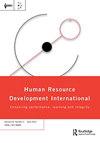Is the dream of flexible work fading?
IF 3.8
Q2 MANAGEMENT
引用次数: 0
Abstract
National lockdowns and social distance measures seem to be a distant memory. We have all been affected by the pandemic and its consequences for work, life and beyond. A central feature of national lockdowns was to protect the public, hence many of us had to work fully from home. This is an experience that we will probably never see again in our lifetime. Most certainly, working from home has shifted the debate on organisational life regardless of industry, role and national context. We have now significant experience of remote working (Li, Ghosh, and Nachmias 2020) with specific desires regarding future work patterns. As we emerge from the pandemic, remote working has become more normalised, more entrenched, and more desired by most professionals. Many scholars highlighted the transition to flexible online working caused by the pandemic and the benefits associated with this form of working (i.e. Shirmohammadi, Au, and Beigi 2022; Teevan 2021; Li, Ghosh, and Nachmias 2020; McGuire, Germain, and Reynolds 2021). The pandemic and stay-at-home orders created uncharted territory for remote working and how to manage employees in a hybrid working environment. It puts Human Resource Development (HRD) professionals at the centre of organisational design to address unprecedented changes at work. As the dust settles, the question is to what extent this emerging, novel form of organising work can be maintained in the longer-term. We have all seen reports in the news that many organisations have called employees back to the office, indicating a desire to revert to the ‘normal way of working’. There is certainly a strong desire to normalise the working environment, with some organisations endorsing the productivity benefits accruing from physical interactive working environments. For example, the CEO of Goldman Sachs expressed his scepticism about the efficiency of remote working whilst others have shown a longer-term openness to embracing flexible working through redesigning their work settings. This shows that the business environment is currently a frenzied zone. A state of excitement for some and a state of fear for others. On the one hand, we have the newbies (new to work-life balance) who have shown an unwillingness to compromise. After months of remote working, they have now become veterans (experienced in flexible work) (Li, Ghosh, and Nachmias 2020) with a desire to maintain a flexible working pattern post pandemic. Interestingly, working remotely for a long time has created several work habits that many professionals are not willing to give up easily. We all know that remote working reduces distractions and commute times, thus providing greater flexibility to employees. For some others, remote working has helped satisfy personal lifestyle goals by relocating to more affordable locations. For others, flexible working offers a more productive pattern of work. ONS (2022) highlighted that half of HUMAN RESOURCE DEVELOPMENT INTERNATIONAL 2022, VOL. 25, NO. 5, 501–505 https://doi.org/10.1080/13678868.2022.2130298弹性工作制的梦想正在消退吗?
全国范围的封锁和社交距离措施似乎已成为遥远的记忆。我们都受到这一大流行病及其对工作、生活和其他方面的影响。国家封锁的一个核心特征是保护公众,因此我们中的许多人不得不完全在家工作。这是一种我们可能一辈子都不会再看到的经历。最肯定的是,在家工作已经改变了关于组织生活的辩论,而不考虑行业、角色和国家背景。我们现在有了远程工作的丰富经验(Li, Ghosh, and Nachmias 2020),并对未来的工作模式有了具体的期望。随着我们摆脱疫情,远程工作已变得更加正常化、更加根深蒂固,大多数专业人员也更希望远程工作。许多学者强调了疫情导致的向灵活在线工作的过渡以及与这种工作形式相关的好处(即Shirmohammadi, Au, and Beigi 2022;Teevan 2021;Li, Ghosh, and Nachmias 2020;McGuire, Germain, and Reynolds 2021)。疫情和居家令为远程工作以及如何在混合工作环境中管理员工创造了未知的领域。它将人力资源开发(HRD)专业人员置于组织设计的中心,以应对工作中前所未有的变化。随着尘埃落定,问题是这种新兴的、新颖的组织工作形式能在多大程度上长期维持下去。我们都在新闻中看到过这样的报道:许多组织已经把员工召回办公室,表明他们希望恢复到“正常的工作方式”。当然,有一种强烈的愿望是使工作环境正常化,一些组织认可物理互动工作环境带来的生产力效益。例如,高盛(Goldman Sachs)首席执行官对远程工作的效率表示怀疑,而其他人则通过重新设计工作环境,对灵活工作表现出长期的开放态度。这表明,目前的商业环境是一个疯狂的区域。对一些人来说是一种兴奋的状态,对另一些人来说是一种恐惧的状态。一方面,我们有不愿妥协的新人(刚开始平衡工作与生活)。经过几个月的远程工作,他们现在已经成为退伍军人(灵活工作经验丰富)(Li, Ghosh和Nachmias 2020),希望在大流行后保持灵活的工作模式。有趣的是,长期远程工作已经形成了许多专业人士不愿意轻易放弃的工作习惯。我们都知道远程工作可以减少分心和通勤时间,从而为员工提供更大的灵活性。对其他一些人来说,远程办公有助于实现个人生活方式的目标,因为他们搬到了更实惠的地方。对其他人来说,弹性工作制提供了一种更高效的工作模式。国家统计局(2022)强调,人力资源开发国际2022年,第25卷,第1期的一半。5, 501-505 https://doi.org/10.1080/13678868.2022.2130298
本文章由计算机程序翻译,如有差异,请以英文原文为准。
求助全文
约1分钟内获得全文
求助全文
来源期刊

HUMAN RESOURCE DEVELOPMENT INTERNATIONAL
MANAGEMENT-
CiteScore
11.40
自引率
11.10%
发文量
43
期刊介绍:
Human Resource Development International promotes all aspects of practice and research that explore issues of individual, group and organisational learning and performance. In adopting this perspective Human Resource Development International is committed to questioning the divide between practice and theory; between the practitioner and the academic; and between traditional and experimental methodological approaches. Human Resource Development International is committed to a wide understanding of ''organisation'' - one that extends through self-managed teams, voluntary work, or family businesses to global enterprises and bureaucracies. Human Resource Development International also commits itself to exploring the development of organisations and the life-long learning of people and their collectivity (organisation), their strategy and their policy, from all parts of the world. In this way Human Resource Development International will become a leading forum for debate and exploration of the interdisciplinary field of human resource development.
 求助内容:
求助内容: 应助结果提醒方式:
应助结果提醒方式:


